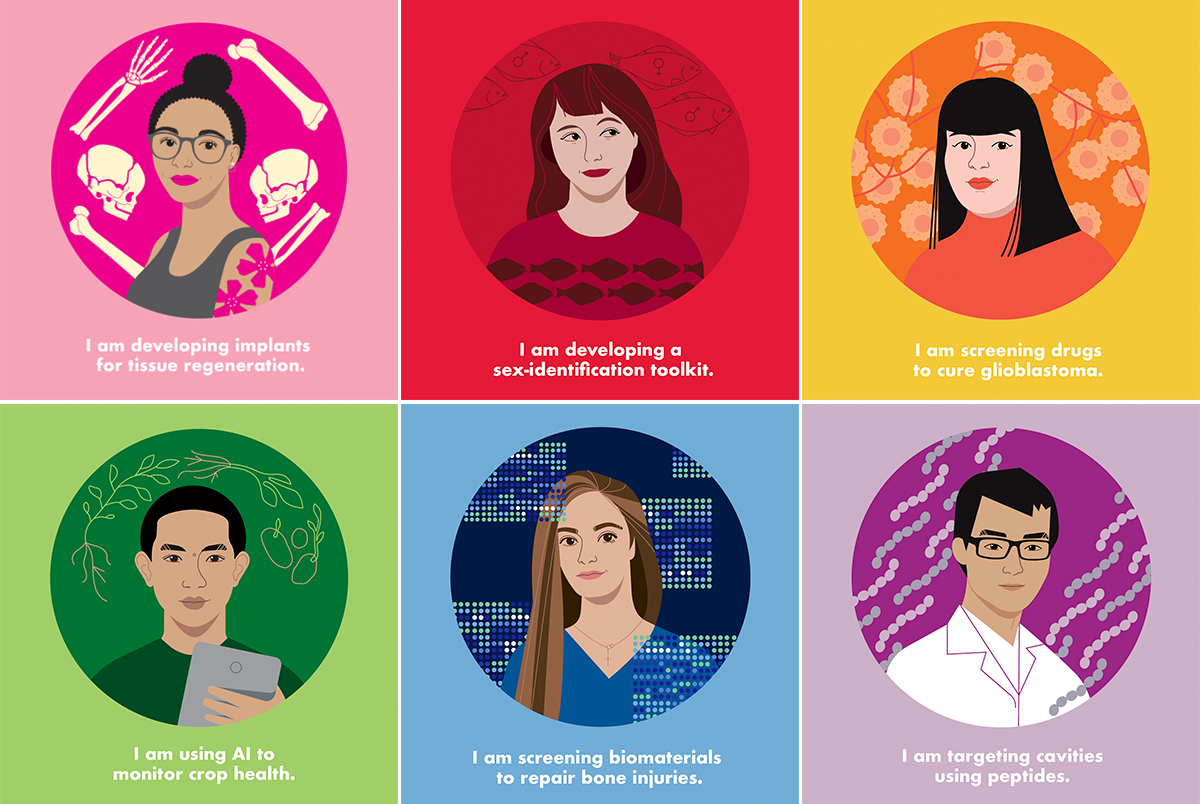The first Young Innovator Program concluded in August 2021. It was a ten-week summer program that was designed to teach trainees how to become innovative leaders in their fields. The program concluded with an idea competition, where the participants showcased the skills that they learned over the summer.

Funded by the Catherine and Don Kleinmuntz Center for Genomics in Business and Society (Kleinmuntz Center), the program was developed by Cecilia Gentle, a former IGB Economic Development Fellow, and Erin Louer, IGB’s education coordinator and manager of the Kleinmuntz Center. It was held for 1-2 hours once a week and the syllabus revolved around teaching the participants all aspects of innovation including patent law, technology transfer, market research, science communication, and entrepreneurship.
The participants were coached by Catherine Kleinmuntz for their final presentations. They were evaluated based how well the participants identified a problem, its solution and market attractiveness, and whether they could complete the project within the proposed budget and time frame. The top three participants were awarded with tiered funds ranging from $5,000-$20,000. The winners will use the funds to advance their novel innovations.
The judges included Mark Tracy, a biopharmaceutical product development executive; Gerald Wilson, the President and Co-founder of Autonomic Materials Incorporated; Jamie Kasuboski, the Vice President of OMX Ventures; and Denise Elser, the Medical Director of the Women’s Health Institute of Illinois. They unanimously agreed that it was difficult to choose the winners and they wished that all the participants could be awarded. Everyone was encouraged to continue working on their innovations and were applauded for their efforts.
The three winners were all graduate students in the lab of Brendan Harley (RTBE leader/EIRH), a Robert W. Schaefer Professor of Chemical and Biomolecular Engineering. Vasiliki Kolliopoulos, who won first place, plans to develop a novel platform to screen biomaterials for bone injuries. Bone is the second most transplanted tissue and the current treatment materials are expensive and require time to make. The proposed platform will use collagen scaffolds that are made up of materials that are already found in bone. The screening platform will be used to test a range of cells and proteins to see how they interact inside the bone environment. If developed, it will be the only 3D high throughput screening platform that is rapid and cost effective.
The second-place winner was Aleczandria Tiffany, who is developing an implant for tissue regeneration. The musculoskeletal system—bone, cartilage, and muscle—can be damaged through diseases like arthritis and osteoporosis and injuries. Unfortunately, the current treatment methods for bone and cartilage tissue repair don’t always match how the native tissue behaves and can sometimes lead to other complications. Tiffany is proposing a new technology, which is inspired by the growth plates—highly specialized tissues in children that are responsible for growth. These regions have three distinct zones that are critical for development and Tiffany plans to develop a material that has similar zones to mimic the growth plate environment. By doing so, she hopes to develop a new tool that can be used to repair damaged tissue.
Victoria Kriuchkovskaia won third place for her project which will attempt to develop a platform to screen drugs for glioblastoma, which is a lethal brain tumor that is currently incurable due to its complex nature and challenging location. It is usually treated with surgery, radiotherapy, and chemotherapy with temozolomide. Although TMZ is the only widely-used drug for glioblastoma, most tumors are resistant. Additionally, it is challenging to develop new drugs because the animal models are expensive and difficult to work with. To deal with this problem, Kriuchkovskaia will develop a 3D brain cancer model that can mimic the tumor environment and can therefore be used to screen different drugs. In collaboration with the Cancer Center at Illinois, Kriuchkovskaia will test thousands of anticancer drugs, many of which were developed by researchers at the University of Illinois.
The other participants included Alida de Flamingh, a postdoctoral fellow in the Malhi lab, who is developing a genomic sex identification toolkit to help in animal conservation efforts; Walden Li, a graduate student in the Jensen lab, who is working on preventing cavities caused by Streptococcus mutans by using peptides that target them without damaging the other members of the microbial community in the mouth; and Sheng Wang, a postdoctoral fellow in the Guan lab, who is combining satellite data and field data, using artificial intelligence, to monitor soil carbon levels and crop health.
The participants enjoyed the program and were grateful for the opportunity. “I found the program very interesting. There were aspects I had never encountered before, such as intellectual property and patenting, and it gave me a good grasp of how to set up projects in the future,” de Flamingh said. “This program was special because we were able to translate our work into product development and market understanding,” Kolliopoulos said. “I learned that you need to talk to people and get involved with your network. Moving forward, I hope to continue applying these skills not only as a graduate student but as a woman in a biosciences career.”
In addition to monetary awards, all participants will also be receiving one year of paid affiliation to EnterpriseWorks at the Research Park. EnterpriseWorks supports the University of Illinois and community entrepreneurs in all stages of their startup journey. Having affiliate status will allow all participants to access the shared working space and facilities, including support with visual branding and website development.
